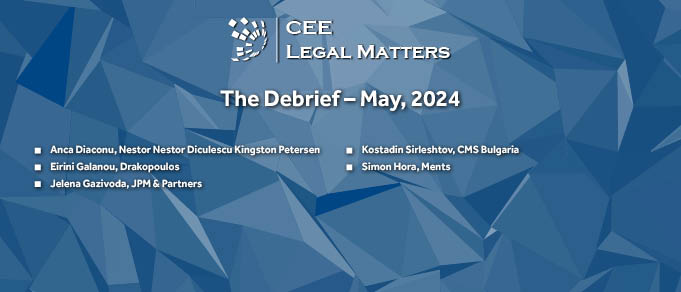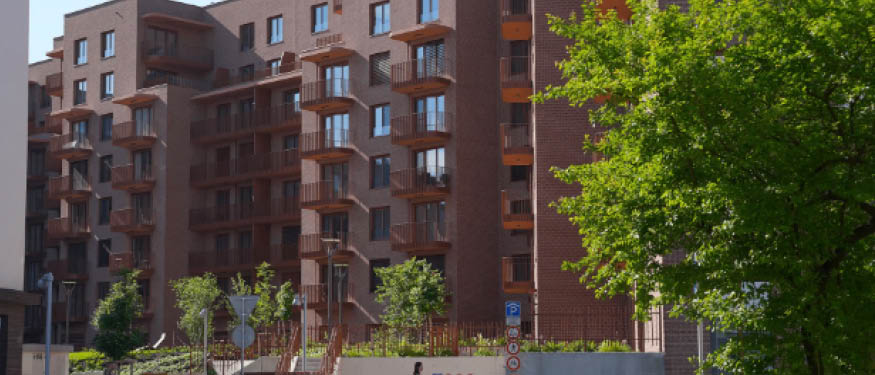In The Debrief, our Practice Leaders across CEE share updates on recent and upcoming legislation, consider the impact of recent court decisions, showcase landmark projects, and keep our readers apprised of the latest developments impacting their respective practice areas.
This House – Reached an Accord
“Over the last month, we saw rapid developments in the renewable energy sector in Bulgaria,” CMS Sofia Managing Partner Kostadin Sirleshtov points out. “The long-awaited publication of the ordinance for connection of producers to the grid was completed and this streamlines the investment into wind and battery storage projects in the country.”
Ments Associate Simon Hora also highlights the recent update in the Slovak Commercial Code, originally derived “from Directive (EU) 2017/1132 relating to certain aspects of company law,” that “regulates financial assistance by a company for the acquisition of its shares by a third party.” Hora notes that, historically, “financial assistance was prohibited not only for public joint stock companies but also for private joint stock companies in Slovakia.” According to the wording of the provision, “financial assistance has been made available to joint stock companies, subject to the fulfillment of certain conditions.” Hora adds that “the provision of the Slovak Commercial Code now allows joint stock companies to provide financial assistance directly or indirectly if it is allowed by the company’s articles of association. At the same time, the following conditions must be met: financial assistance must be provided on fair market terms, the board of directors must verify the financial status of the recipient of the financial assistance, the provision of financial assistance must not reduce the company’s equity below a specific value, and the company must create a special reserve fund in the amount equal to the financial assistance provided.” Hora concludes that the “changes in the Commercial Code have the potential to improve the Slovak M&A environment as they are beneficial for M&A activity in times when external bank financing is getting expensive and provide for more flexibility in structuring the transaction.”
Drakopoulos Senior Associate Eirini Galanou highlights that in Greece, Law 5099 was published in the Government Gazette on April 5, 2024. It introduced, inter alia, “the development of a new platform by the General Secretariat for Information Systems & Digital Governance.” The new platform, according to her, “will operate under the name ‘Know Your Business – eGov-KYB’ and will be used for the authentication of the data of legal entities in accordance with the requirements set by the relevant provisions of the law on the measures of enhanced and ordinary due diligence.” In particular, Galanou points out that “Article 37 of the law provides that any natural person acting as the legal representative of a legal entity may request the extraction of certain data necessary for the authentication of the legal entity, as well as the transmission of such data to credit and financial institutions.” According to Galanou, the data extracted from the information systems of public sector bodies will include, among others, “information on the legal entity’s business activity, corporate name, distinctive title, legal form, registration number in the General Commercial Registry, tax identification number and other tax and financial data,” as well as “personal details of the legal representative, shareholders/partners, and members of the management bodies of the legal entity, including the percentage of the shareholders’/partners’ participation in the entity.” Galanou reports that “joint ministerial decisions are expected to be adopted, which will further specify the above issues and requirements, as well as the launch date of the platform.”
This House – Under Review
Sirleshtov reports that Bulgarian parliament members “are discussing changes to the environmental legislation to allow for shorter environmental assessment for new energy projects and less time for potential judicial appeals.”
In the Works
JPM & Partners Senior Partner Jelena Gazivoda draws attention to the recent energy developments in Serbia. “The highlight of March 2024 was the signing of a series of contracts pertaining to the financing of the ‘Pupin’ Wind Farm Construction,” Gazivoda says. “This forthcoming wind farm, slated for development within the Municipality of Kovacica in south-western Banat, will feature 16 wind turbines collectively generating 94.4 megawatts of power. Anticipated to cater to the annual energy demands of approximately 40,000 households, the project boasts a total investment of EUR 100 million.”
“The contract suite includes agreements for electricity purchase and balance responsibility between Enlight Renewable Energy and Elektroprivreda Srbija, spanning 15 years,” Gazivoda continues. “Additionally, a facility agreement has been established between the EBRD, Erste Bank, and Enlight Renewable Energy.”
The conclusion of these contracts, according to Gazivoda, “solidifies the financial and commercial framework for this project, poised to advance the objectives of the energy transition by generating green megawatts at competitive prices. This achievement precedes the forthcoming launch of new auctions envisaged for the second quarter of 2024, aligning with the Ministry of Mining and Energy of the Republic of Serbia’s three-year plan to integrate 1,300 new megawatts of capacity into the premium system.”
Sirleshtov additionally points to the recent energy projects in Bulgaria. “The tenders for battery storage grants under the Resilience and Recovery Plan of Bulgaria were also launched,” he says. “With the deadline set on June 12, renewable energy producers are eligible to receive up to 50% grants for their battery storage facilities.” At the same time, Sirleshtov notes that “OMV Petrom became the only title holder for the Han Asparuh offshore block in the Bulgarian Black Sea thus giving hope that following g the Final Investment Decision for Neptune block in Romania, the company will drill another well in Bulgaria in 2024/2025.”
Regulators Weigh In
Nestor Nestor Diculescu Kingston Petersen Partner and Head of Competition Anca Diaconu reports that in April 2024, “the Romanian Competition Council launched a public consultation process concerning the commitments proposed by the Romanian Poultry Producers’ Association and several companies, as part of the investigation on the poultry meat market.” According to Diaconu, the investigation concerns “an alleged exchange of sensitive information between meat producers/traders and an association they participate in (during meetings of said association) – which allegedly aimed to limit deliveries of poultry meat.” In brief, Diaconu notes that “the proposed commitments concern, in particular, the implementation of a black-box mechanism – ensuring that the association only accesses and disseminates aggregate and anonymized information received from companies.” The association, according to her, “also undertakes, inter alia, to amend its statute and to disseminate newsletters to third parties and publish them on its own website.”
On top of that, Diaconu highlights that “the investigated companies proposed the implementation of internal procedures for both internal and external information flows and competition law compliance programs. Notably, two investigated companies are no longer active in the relevant market, nor are members of the association. Should these companies decide to resume activities on the relevant market and/or to become members of the association during the monitoring period (36 months following implementation), they undertake to observe the corresponding commitments.”
In Related News
Finally, Sirleshtov highlights a recent appointment in the Bulgarian government: “With the formation of the new caretaker government and General elections happening on June 9, 2024, the former CEO of the natural gas TSO Bulgartransgaz, Mr. Vladimir Malinov, was appointed as the new Minister of Energy, thus giving hope for completion of the pending gas infrastructure projects like the Bulgarian section of the Vertical Gas Corridor.”
This article was originally published in Issue 11.4 of the CEE Legal Matters Magazine. If you would like to receive a hard copy of the magazine, you can subscribe here.

















